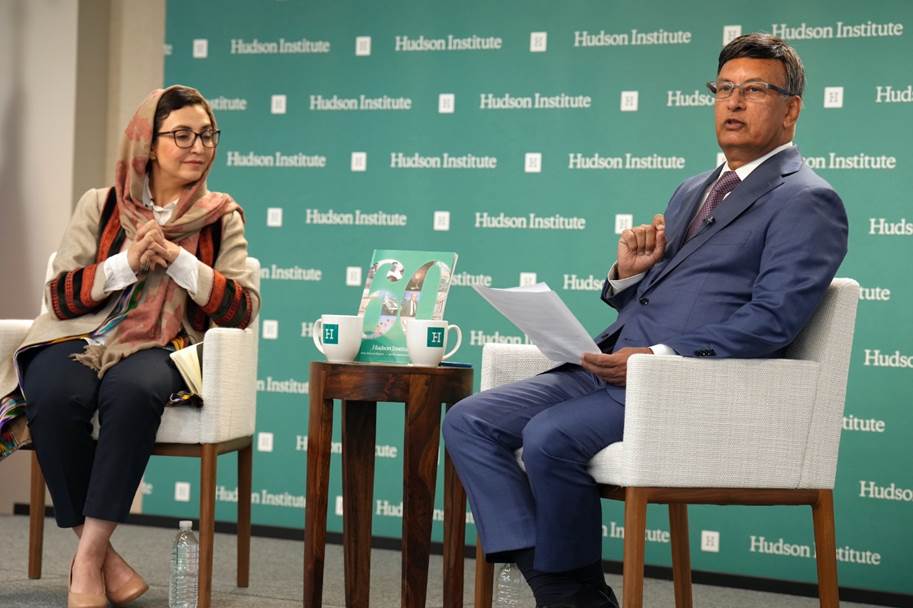
Ambassadors Adela Raz and Husain Haqqani
US Policy and Taliban Rule in Afghanistan
By Elaine Pasquini
Photo by Phil Pasquini

Washington: Since American troops left Afghanistan almost two years ago, media attention has waned as news outlets – and the Biden administration – are focused on the war in Ukraine and the rise of China on the world stage. On April 3, Adela Raz, former ambassador of Afghanistan to the United States and her country’s former permanent representative to the United Nations, sat down with Husain Haqqani, former ambassador of Pakistan to the US, now director for South and Central Asia at Washington’s Hudson Institute, to discuss US policy in Afghanistan in light of the Taliban takeover.
“We really have no idea how to handle the crises in Afghanistan, Raz, presently a Hudson Institute visiting fellow, acknowledged. When the Taliban came to power “…we knew they would never agree to women going to work, being educated or being in the forefront of society,” she said. “Right now, women are banned from public spaces, from higher education, from work in a country where about half the population are women.”
In Washington, Raz noted, there is talk about the need for schools to re-open for girls, but less discussion about what is happening with the existing curriculum in the schools that men are attending. “There is a very gradual change in the curriculum and a drastic radicalization,” which is worrying for what it means to the youth in Afghanistan, she explained. “We’re also seeing that they are going towards the radicalization of society.”
With respect to whether the Taliban will rescind their policies restricting women’s rights, Raz stated: “The expectation that one day they will do that might be too idealistic at this stage.” The people of Afghanistan, however, have asked for change since the Taliban takeover, but they have had no outside support, she lamented. And the pockets of resistance inside the country, she added, are still very small.
Raz described the pain she feels when she hears people say Afghans “rejected” democracy. “It was not that we rejected democracy, it was that the type of democracy that was created probably was not the right model,” she explained. “We need to reflect, to find alternatives and move forward.”
On the subject of the United States’ future role in Afghanistan, Raz emphasized that Washington’s foreign policy is dictated by administrations and by political constituents. “Because of how brutal the collapse of Afghanistan was, at this stage, I think the political appetite is not strong enough to go and ask the hard questions and probably it will take a little bit more time.” US special representative for Afghanistan Tom West and his colleagues at the State Department, she said, are trying their best “but it’s how much of a mandate they have and which direction they need to go and that really comes from above. The US needs to get engaged with a stronger political will.”
Haqqani argued that, in addition to losing prestige, the US withdrawal from Afghanistan encouraged rivals to move into other arenas. “Would Russia have been able to invade Ukraine had America not withdrawn from Afghanistan?” he asked, noting that China is already moving into Afghanistan to expand its Belt and Road Initiative.
Since China recently signed an agreement with the Taliban to extract oil from the Amu Darya basin in the north, they will be economically involved there. “This notion that somehow we will leave Afghanistan to pay attention to China is proving wrong because China is already in Afghanistan,” he added.
In Haqqani’s opinion, Washington needs to revisit the mistakes that kept the US in Afghanistan for so long. “America tried to accomplish too much, tried to cast Afghanistan in America’s image, tried to build a military exactly like the American military without thinking that Afghanistan could not afford a US-style military,” which depended on American contractors, he opined.
Haqqani noted that 70 percent of the population is under the age of 30 and 46 percent are under the age of 15. “This is the population going to school right now, so if you deprive women of schooling beyond grade five and if you teach young boys a very radical ideology you are actually producing the future soldiers for al-Qaeda or anther terrorist group,” he said.
The Taliban are an ideological group that will not change, Haqqani put forth. The group’s prime minister Mullah Hasan Akhund recently said in a speech that “the Taliban are not here to provide food for the people; God will provide for that,” he related.
Today, the Taliban have advantages that the group didn’t have in the 1990s when they controlled Afghanistan. At that time, they didn’t have exposure to the world as they do now, he said. In the ‘90s, they took over a totally destroyed country. Now they have inherited infrastructure, including a cell phone system.
Moving forward, in order to prevent an unstable South and Central Asia, the United States needs to “get over this overly simplistic view that…Afghanistan is not strategically significant and, therefore, America can just afford to walk away from it,” Haqqani said. “The prospect of a failed state of 39 million people at the crossroads of South Asia, the Middle East and Central Asia is not a good idea to begin with and there should definitely be some concern about the spillover from Afghanistan into Central Asia and Pakistan. Afghanistan will remain important for US policy, and…should attract some policy discourse, discussion, and decisions.”
(Elaine Pasquini is a freelance journalist. Her reports appear in the Washington Report on Middle East Affairs and Nuze.Ink.)

